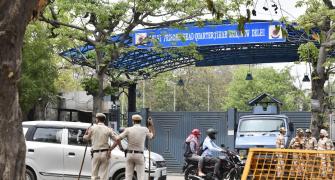The government's attempt to pass on its social obligation to unaided educational institutions is undemocratic
P V Indiresan, former Director, IIT, Madras
"Let's face it - reservation policy has nothing to do with social justice and everything to do with power politics"
Democracy is about choice, dictatorship is about compulsion. Democracy is about the freedom of the weak to pursue happiness; dictatorship is about a naked exercise of power over the weak. Democracy is freedom to express contrary views without fear; dictatorship is the fear to express oneself.
Parliament will soon amend the Constitution to compel private institutions to follow government dictates on reservation in admissions. Almost definitely, the amendment will be passed unanimously without a single dissenting voice. It is impossible that every single MP agrees with the proposal. Yet, not one will dare to speak against it. In this instance, India is not a democracy; it suffers from dictatorship.
Reservation is said to be about social justice. Yet, reservation in colleges will help only those 10 per cent of the students who reach that level. Almost all of that 10 per cent will be from the top layer. To top it all, vociferous proponents of reservation like Lalu Prasad have kept the remaining 90 per cent poor among their caste brethren in utter educational destitution.
Let's face it -- reservation policy has nothing to do with social justice and everything to do with power politics. There are any number of people in high positions, Cabinet ministers even, whose children have grabbed what the poorest of the poor should have got if there had been social or economic justice.
For every rich, powerful "backward caste" student who gets special privileges, there are several more of the poor among the "forward castes" whose future has been damaged beyond repair.
The present move to extend reservation is based on the belief that false promises will win more votes than real development will. For a number of years, that was true. However, the recent Bihar elections have confirmed that while all people can be fooled for sometime, all people cannot be fooled for all time.
Suppose a political party presents a scheme for empowering all poor people to get profitable education that will assure an attractive career. Then, that party will have something to offer to 90 per cent of the electorate instead of an uncertain sop to a mere 10 per cent of them.
And it will do so without arousing any hostility the way reservation policy does. So, there is a political choice: offer development for the poor or reservation for the rich. Instead of
offering a democratic choice, our national parties have surrendered to casteists. Will that abject surrender strengthen the national parties or will it marginalise them even more?
It is said that Kalidasa was discovered cutting at the trunk of a tree while sitting on its branches. Our national parties are doing the same on the tree of democracy. Kalidasa went on to become a great poet.
Our parties can do the same but that requires a different kind of Gandhi, the type casteist MPs and gutless others have decided to collude and martyr in Parliament.
D Shyam Babu, Fellow, Rajiv Gandhi Institute for Contemporary Studies
"Rather than have private institutes implement reservation, they should be forced to become aided institutions"
A messy problem invariably throws up messy solutions. The Union government's decision to amend the Constitution to provide reservations in private unaided educational institutions is more a necessary evil than a panacea.
The caste-stipulated inferiority alone accounts for poverty and backwardness of groups such as SC/STs, and one of its cumulative effects is that such groups remain "merit-less", thus needing special protection.
But can one expect private unaided educational institutions to follow, as the state does, the same compensatory discrimination policies in favour of disadvantaged sections? And why?
Critics of the move cite Fundamental Rights of the unaided colleges to manage their affairs the way they deem appropriate. They also contend that implementing reservations will put undue financial burden on them.
The fact that unaided colleges don't receive any state aid does not make them islands of autonomy. To the claims of freedom of action by these colleges, the state can as well respond by not recognising their degrees and/or by offering employment to only those educated in government/government-aided colleges. Such recourse will be as illogical as the autonomy argument.
But can we allow commercialisation of education? Those intent on making profits are free to choose from hundreds of professions, and education should not be one of them. In fact, the unaided category is a grey area.
Irrespective of the law, most of those running unaided colleges do so only for profits. More than making them implement reservations, the government should force them to become aided institutions. Such a policy will serve two purposes. One, the argument that unaided means they have no obligations (something the apex court upheld) will become invalid.
Two, in providing aid, the government will be sharing the burden of social inclusion -- something it might have tried to escape.
One positive outcome of the legislation will be that as their profits dwindle because of reservations, these unaided colleges may soon have to opt for aided status, if not go out of "business" outright.
Those institutes run by the government symbolise how public money gets wasted and reservations there have failed to help the weaker sections. The middle path is aided educational institutions for they have proved to be efficient compared to government institutions, and they also implement reservations.
Much chest beating is likely to follow against the proposed legislation and the government deserves most of the blame. It neglected public education; spent too little; and spent unwisely to land the country in the present mess. But let us not assume that the "government" is an alien outfit imposed on us from outer space. It's been spewed by the same society of which even the "private unaided educational institutions" are a part.The views expressed are personal








